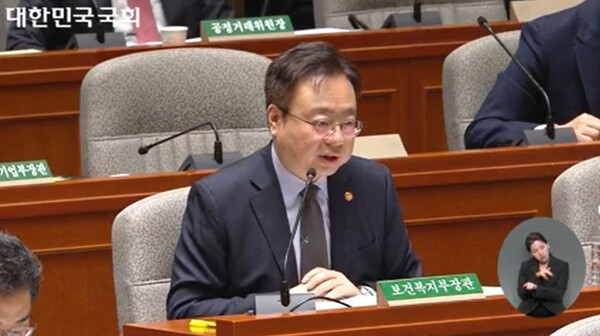The government has announced that it would gradually expand the National Mental Health Investment Project, which provides psychological counseling for the mental health of the entire population.
By 2027, the government aims to have 1 percent of the population receive the service.

Minister of Health and Welfare Cho Kyoo-hong said so on Monday while responding to a question from Rep. Lim Byung-heon of the People Power Party at a plenary session of the National Assembly’s Budget and Accounting Committee, who asked about the project’s plans as a means to lower the suicide rate.
The budget for next year's National Mental Health Investment Project is 53.9 billion won ($41.39 million), similar to this year's 55 billion won.
"Since the current mental health policy is focused on treating severe mental illnesses, there are relatively few preventive policies for those suffering from depression or anxiety disorders, so we have come up with a plan to respond to this," Minister Cho said.
The government plans to provide counseling services to all people with mental health problems, Cho said, adding that the ministry plans to expand the project in stages from next year so that 1 percent of all citizens can receive services by 2027.
Some lawmakers pointed out that the support policies promoted by the ministry to overcome the declining birthrate are ineffective, emphasizing the need to work out effective policies in the field instead of just complaining about the budget shortage.
"In August, the Anti-Corruption and Civil Rights Commission (ACRC) surveyed opinions from prospective parents and made 17 policy proposals to the health and welfare ministry that could contribute to solving the declining birthrate," Rep. Eom Tae-young of the PPP said. “ACRC called for, among others, expanding budget and manpower to convert pregnancy-related tasks into national projects.”
Rep. Eom noted that various local governments are implementing (birthrate-boosting projects) independently, which only creates conflicts and does not help. There are many complaints about support policies in the field. When people apply to health centers for prenatal examinations, they are told that there is a lack of budget and manpower, he added.
"Solving the low birthrate problem cannot be done at a desk," Rep. Eom said. "Please dig into the people's livelihoods, listen to their vivid voices, and establish effective policies."
Related articles
- Alarming surge in depression among education workers sparks concerns for mental health crisis
- ‘Teachers are emotional workers needing psychological support system’
- [Analysis] The reality of migrant workers’ mental health in Korea
- ‘Physician-assisted suicide feared to fall into easier option than palliative care’
- Can winter swimming boost mental health?

